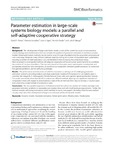Parameter estimation in large-scale systems biology models: a parallel and self-adaptive cooperative strategy

Use este enlace para citar
http://hdl.handle.net/2183/20954Coleccións
- Investigación (FIC) [1655]
Metadatos
Mostrar o rexistro completo do ítemTítulo
Parameter estimation in large-scale systems biology models: a parallel and self-adaptive cooperative strategyData
2017Cita bibliográfica
Penas, D. R., González, P., Egea, J. A., Doallo, R., & Banga, J. R. (2017). Parameter estimation in large-scale systems biology models: a parallel and self-adaptive cooperative strategy. BMC bioinformatics, 18(1), 52.
Resumo
[Abstract]
Background
The development of large-scale kinetic models is one of the current key issues in computational systems biology and bioinformatics. Here we consider the problem of parameter estimation in nonlinear dynamic models. Global optimization methods can be used to solve this type of problems but the associated computational cost is very large. Moreover, many of these methods need the tuning of a number of adjustable search parameters, requiring a number of initial exploratory runs and therefore further increasing the computation times.
Here we present a novel parallel method, self-adaptive cooperative enhanced scatter search (saCeSS), to accelerate the solution of this class of problems. The method is based on the scatter search optimization metaheuristic and incorporates several key new mechanisms: (i) asynchronous cooperation between parallel processes, (ii) coarse and fine-grained parallelism, and (iii) self-tuning strategies.
Results
The performance and robustness of saCeSS is illustrated by solving a set of challenging parameter estimation problems, including medium and large-scale kinetic models of the bacterium E. coli, bakerés yeast S. cerevisiae, the vinegar fly D. melanogaster, Chinese Hamster Ovary cells, and a generic signal transduction network.
The results consistently show that saCeSS is a robust and efficient method, allowing very significant reduction of computation times with respect to several previous state of the art methods (from days to minutes, in several cases) even when only a small number of processors is used.
Conclusions
The new parallel cooperative method presented here allows the solution of medium and large scale parameter estimation problems in reasonable computation times and with small hardware requirements. Further, the method includes self-tuning mechanisms which facilitate its use by non-experts. We believe that this new method can play a key role in the development of large-scale and even whole-cell dynamic models.
Palabras chave
Dynamic models
Parameter estimation
Global optimization
Metaheuristics
Parallelization
Parameter estimation
Global optimization
Metaheuristics
Parallelization
Versión do editor
Dereitos
Atribución 3.0 España
ISSN
1471-2105






